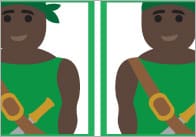“You Wouldn’t Do That At Home, Would You?”

When I was teenager we had one teacher in particular who we didn’t respect, and whose life we made very difficult. Let’s call him Mr Chips. Looking back on it, we behaved badly because he didn’t engage us with well-planned and interesting lessons, but also because we felt he didn’t have a grip on discipline. To try and keep us in check Mr Chips used to fly off the handle a lot, which could be quite scary.
Part of the problem was that he used sarcasm. So rather than tell us what we needed to do, he used a few stock phrases such as, ‘Where do you think you’re going? / I don’t remember telling anyone to leave their seats/ Who do you think you are?’ etc. We would laugh whenever he came out with this, and some of us (including me) used to use these phrases when we were impersonating him. If Mr Chips came into the room and someone was sitting on a desk he would say, “You wouldn’t do that at home would you?” We would wait for him to say this, and then laugh conspiratorially among ourselves. This would stoke his fury, and he would come out with more stock phrases like, ‘Wipe that smile off your face/No one else is laughing” (when lots of people were).
It was to be a few years until Roger Waters penned the immortal lines to Pink Floyd’s song, but if we had heard it then, I’m sure we would have identified Mr Chips as using ‘dark sarcasm.’ After all, he could have said something like, “Please take your feet off the desks.” At the time we all swore that, in the unlikely event that any of us were ever put in charge of a group of children, we would never use such stupid phrases like ‘You wouldn’t do that at home, would you?’
30 years later I was in charge of a group of four-year-old children in a nursery school, in my capacity as advisory teacher for children with speech and language difficulties. I was leading a fun language activity in the main room; where there was quite a lot of background noise. I was working really hard to help the children focus on our game and to listen to each other. The nursery was being inspected, and I thought I’d help out by suggesting that the Ofsted inspector observe my group. All was going well until a little boy came over and started jumping on a small sofa nearby. Bang! Out of nowhere it happened. I turned and said to him, “Oi! You wouldn’t do that at home would you?” To which the little boy replied, “Yes I would. My mummy lets me.”
What the inspector furiously scribbled in her notebook shall forever remain a mystery, but I do remember that she was not smiling. Luckily the nursery head teacher (who was infinitely more enlightened than Mr Chips), came over and saved the day. She said to our little jumping friend, “In Nursery we sit on the sofa and jump about outside. You’re a bit of a jumping bean, so if you want to be jumpy then jump about outside.” Off he went. She was an outstanding head teacher who led an outstanding school. Unfortunately she was supported by an advisory teacher with a lot to learn about the link between adult language and children’s behaviour.
The link between what we say and how children respond is very strong. When we analyse what led up to an incident of challenging behaviour, it is often the adult’s use of language that either created or compounded the problem. There can sometimes be a very wide difference between what we think we mean and what we actually say. I did not tell the little bouncing boy what to do. I used my tone of voice to let him know I wasn’t pleased, made the assumption that he knew that what he was doing was wrong, and also indirectly slagged off his mother’s parenting skills. It may not have been ‘dark sarcasm’, but it wasn’t helpful.
On my Supporting Quiet Children training course we spend a lot of time thinking about the way we talk to children, and matching what we say to what we mean. For example, instead of saying ‘Would you mind sitting down Claire?’ (Which implies that she has a choice, and just might lead to her saying ‘No!!!!’) We practice saying, ‘Claire. Sit down please. Thank you.’ Instead of saying, ‘It’s raining. Shall we go in now?’ Or ‘It’s raining. We need to go in now. Is that OK?’ We say, ‘It’s raining. Let’s go in/ It’s time to go in/ We need to go in.’ We are saying what we mean and meaning what we say. We are being clear. This is helpful for all children, and particularly for very quiet children or those who need clear boundaries: both of whom will be unsure.
Quiet and anxious children may be unsure of what you mean and find themselves unable to respond. Children with additional learning needs may think they have a choice and not respond in the way we expect. Children with outwardly challenging behaviour may perceive you as someone with ‘fuzzy’ boundaries and respond negatively. The difference between being unclear or clear is subtle. But being clear works. And it works because we are building an image in the children’s minds of us as adults who are clear about what we expect. This reassures children and helps them relax and respond appropriately. It helps to build up their trust and confidence, which are important foundations for developing confident talking in groups.
So we would have respected Mr Chips more if he had been clear in his use of language. Then there was the small question of his badly planned lessons. I hope he was able to get some training that would inspire him to inspire future pupils. Or did he become, all in all, just another brick in the wall?
We don’t need no education,
We don’t need no thought control.
No dark sarcasm in the classroom:
Teachers leave us kids alone.
(From Another Brick in the Wall (Part 1) by Pink Floyd)
Supporting Quiet Children by Maggie Johnson & Michael Jones is available from www.lawrenceeducational.co.uk
Comments
Leave a Reply
Popular Teaching Resources
Stay Up To Date
Sign up for our newsletter and we’ll let you know when we create new early years resources.






Another great blog Michael. Challenging and funny. I think we all remember a Mr Chips and they are still around
Hi Judith
I think that teachers are often under tremendous pressure, just to keep on top of ‘delivering’ the curriculum, let alone supporting groups of children with constantly challenging behaviour. It’s just that we can get into bad habits that, when we look at them closely, make situations worse. It boils down to the language that we use.
best wishes
Michael
It is funny I always remind the team I work with, and any new team members that all children’s homes are different, so we need to change our language and remind the children of the rules at playgorup, rather than ask “is that what you do at home?”. Thank you for the reminder and I learn so much from your blogs keep them coming.